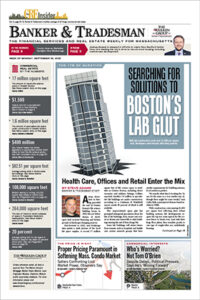Tom Andrews, executive vice president at Alexandria Real Estate Equities, remembers past decades when many major commercial developments rarely included retail features.
And if they did, they were often tucked into little side corners, like small interior newsstand kiosks, unseen by the outside public and frequented almost exclusively by building tenants.
“Retail used to be an afterthought,” recalled Andrews, a 26-year veteran of the commercial real estate and development industry. “It wasn’t that important.”
Today, it’s almost unthinkable for many commercial developers – as well as major property owners who acquire and renovate older buildings – to proceed with major projects without giving careful thought and planning to attracting a mix of highly visible, usually ground-floor, retail shops and restaurants.
It’s all part of the “live, work, play” trend of creating more vibrant neighborhoods for an increasing number of tenants who demand such amenities in order to attract talented workers, many of them young professionals eschewing the suburban office parks of their fathers and mothers.
In the 1990s, then-Boston Mayor Thomas Menino is credited with being one of the first to institutionalize the concept that major office, lab and multifamily developments had to include ground-floor, sidewalk-facing retail shops and restaurants. Other communities have followed suit, including Cambridge and Somerville.
Developers Given Incentives
In Cambridge, Brian Murphy, assistant city manager for community development, said there’s no strict ordinance requiring ground-floor retail. But retail is indeed “strongly urged” and the city offers a number of incentives, including increased floor area ratios, to encourage developers to dedicate more space to retail.
At Alexandria Real Estate, Andrews said his firm doesn’t need much encouragement. As owner and developer of a number of major properties in Cambridge – including Technology Square and the massive under-construction Alexandria Center in Kendall Square – the firm aggressively recruits top-notch restaurants and shops for its buildings, firmly believing it’s what the market is demanding, Andrews said.
Alexandria’s Technology Square, for instance, now leases space to the well-regarded Area Four and Catalyst restaurants on its ground floors.
“People are spending more time out of their offices and doing work in all sorts of places,” said Andrews, noting that the rise of smartphones and tablets have accelerated the trend of people being able to do work outside their offices and labs.
And those employees want to meet clients, industry colleagues and others at public places such as coffee shops, bars and restaurants.
Suburbs Follow Suit
It’s not just cities like Boston and Cambridge that are pushing the mixed-use “24/7” concept. Suburban office parks are increasingly adding restaurants, shops and even some housing components to their properties.
“No question it’s a trend,” said Jon Hurst, president of the Retailers Association of Massachusetts. “It’s ultimately a movement by consumers to return to more of that ‘Main Street’ feel.”
In smaller towns, community leaders are also pushing for mixed-use revivals of their downtowns, often tied to sites near public transit stations, he said. Newton and Brookline are among two other cities actively pursuing mixed-used strategies, Hurst said.
In Beverly, Hurst is working with the nonprofit Beverly Main Street, which is attempting to rejuvenate its two downtown areas: One along Cabot Street and the other along Rantoul Street, near a new train station and where new housing is being built.
“There’s a real desire by residents to preserve and promote what they remember – those old New England downtowns,” he said.
In Cambridge, Bill Kane, vice president of leasing and development for Biomed Realty Trust Inc., said he can’t imagine building or renovating buildings without some sort of retail component.
At its massive Cambridge Research Park, Biomed Realty has been steadily developing a total of four buildings over the years, three of them finished and one of them coming on line next March. All four have, or will have, ground-floor retail components, he said.
At 650 East Kendall St., the cutting-edge Le Laboratoire, a modernistic restaurant with “lab space” to test new foods, plans to open its doors later this month, Kane said. Biomed Realty has also attracted the popular Tatte Bakery of Brookline to its Cambridge properties.
Meanwhile, nearly 6,000 square feet of Biomed Realty’s latest 63,000-square-foot building, now under construction on Kendall Street, will be dedicated to retail, he said.
“You’re dealing with very sophisticated people who want these type of things,” said Kane of Biomed’s tenants. “Twenty years ago, it wasn’t the norm. But today companies are more collaborative and want these amenities. It’s what they want.”
Email: jayfitzmedia@gmail.com




